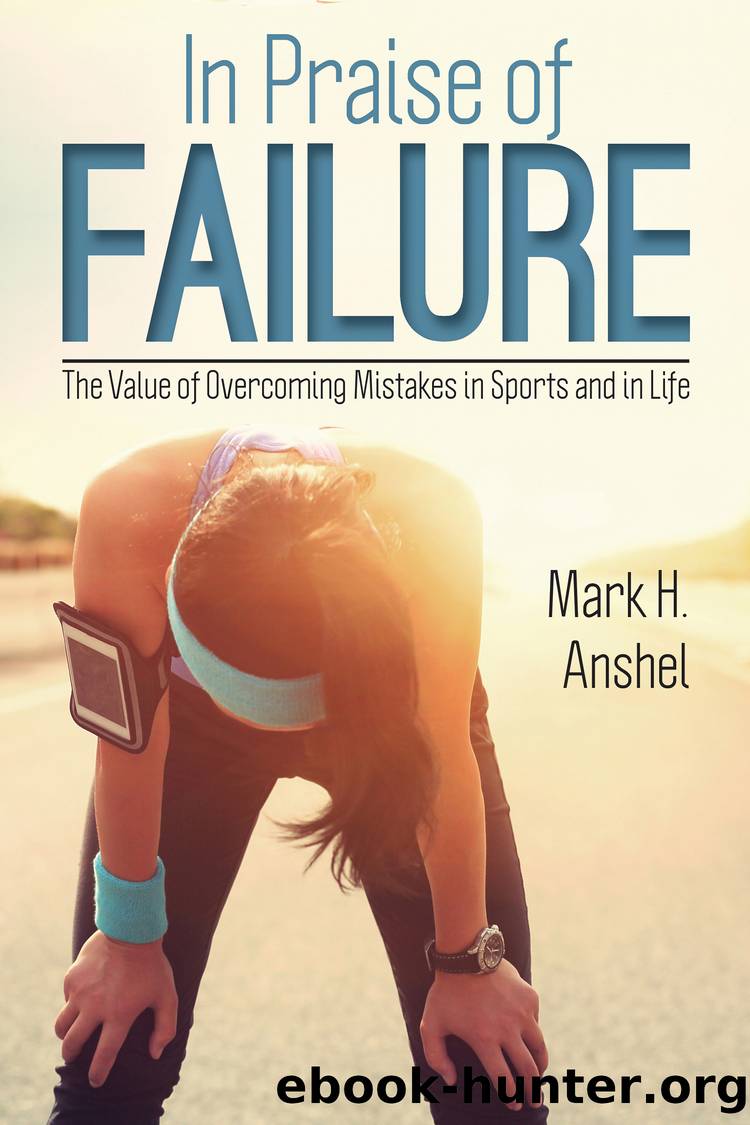In Praise of Failure by Mark H. Anshel

Author:Mark H. Anshel [Anshel, Mark H.]
Language: eng
Format: epub
Publisher: Rowman & Littlefield Publishers
Published: 2016-07-14T16:00:00+00:00
Desirable Dispositions in Handling Failure
Mental Toughness
Mental toughness in sports means reaching and sustaining high performance, particularly under pressure, by expanding capacity physically, mentally, and emotionally. Mentally tough athletes have the ability to ignore elements of interference during competition. Authors agree that mental toughness is learned, not inherited. One common, but false, view of many athletes and coaches is that we are born with the right “competitive instincts” and that not being able to handle failure is due to lacking the genetic predisposition to be mentally tough. The belief in a mental toughness gene is very tempting because it absolves the athlete of feeling responsible for performance failure. This is self-destructive thinking because the athlete is more likely to feel helpless, lack self-control about developing mental toughness, and lack the self-motivation to learn the proper mental skills to become more competitive.
Mentally tough competitors are self-motivated and self-directed; their energy comes from internal sources; it is not forced from the outside. Mentally tough athletes remain positive but realistic; they are builders and optimistic, not critics, fault finders, and pessimistic. They are in control of their emotions (they have “tamed the lion inside” in response to frustration and disappointment), calm and relaxed under fire (rather than avoiding pressure, they are challenged by it), highly energetic and ready for action (capable of getting themselves pumped up and energized for optimal effort and performance), determined (they have a strong will to succeed and are relentless in the pursuit of goals), mentally alert and focused (capable of long and intensive periods of full concentration), doggedly self-confident (have a high belief in their ability to perform well), and fully responsible (take full responsibility for their own actions).
Personal Traits of Mentally Tough Athletes
The literature reflects the following characteristics of mentally tough athletes. They have high self-esteem, have a sense of commitment, are self-disciplined, have a strong desire to succeed, feel personal accountability (responsible for performance outcomes), are competitive, have high but realistic self-expectations, have no (or controlled) fear of failure, have high goal orientation (very motivated by setting and meeting goals), and are hardy/resourceful.
Thoughts and Actions of Mentally Tough Athletes
Mentally tough athletes develop a pregame routine and have the ability to ignore elements of interference during competition. They also show emotional control, optimal arousal, confidence, intrinsic motivation, optimism, controlled anxiety, concentration and attentional control (alert and mentally focused), proper situational appraisals (challenge, not threat), good coping skills (deals effectively with adversity), and a sense of enjoyment in the competitive setting. These athletes perform automatically and project a positive attitude (positive body language),
Strategies for Building Mental Toughness
A review of literature shows the mentally tough athlete possesses these strategies for building mental toughness in sport, which, in turn, will improve the ability to overcome failure:
Maintains high (strength and endurance) fitness
Improves and uses mental skills
Sets realistic, but challenging, goals
Thinks positively and creates enthusiasm
Repeats self-positive affirmations (self-talk)
Maintains self-discipline (self-control)
Uses positive visualization (images successful/desirable performance)
Reviews film/video of best performances (or recalls them)
Prevents choking during contests, thinks about practice performance
Views competition as challenging,
Download
This site does not store any files on its server. We only index and link to content provided by other sites. Please contact the content providers to delete copyright contents if any and email us, we'll remove relevant links or contents immediately.
Unstoppable by Maria Sharapova(3118)
The Inner Game of Tennis by W. Timothy Gallwey(2990)
Urban Outlaw by Magnus Walker(2950)
Crazy Is My Superpower by A.J. Mendez Brooks(2860)
The Social Psychology of Inequality by Unknown(2311)
The Fight by Norman Mailer(2159)
Unstoppable: My Life So Far by Maria Sharapova(2128)
Going Long by Editors of Runner's World(1921)
Accepted by Pat Patterson(1917)
Motorcycle Man by Kristen Ashley(1862)
The Sports Gene: Inside the Science of Extraordinary Athletic Performance by David Epstein(1822)
The Happy Runner by David Roche(1821)
Backpacker the Complete Guide to Backpacking by Backpacker Magazine(1815)
Sea Survival Handbook by Keith Colwell(1796)
Futebol by Alex Bellos(1785)
Mind Fuck by Manna Francis(1744)
Peak: Secrets from the New Science of Expertise by Anders Ericsson & Robert Pool(1662)
Endure by Alex Hutchinson(1605)
The Call of Everest by Conrad Anker(1550)
